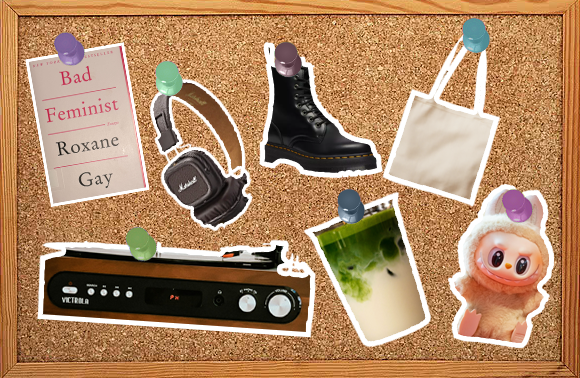
Standard items associated with the “performative male” online meme. Graphic made by Keva Elie '26 on Adobe Photoshop. Images from Unsplash.
On September 21, the senior class officers at MFS announced via email the selection of “Performative Male Day” as one of the three theme days for Spirit Week, following a series of voting procedures. While some community members at the school view the “performative male” trend as an overgeneralization of men who engage in stereotypical performative behaviors, many see it as a funny yet accurate representation of consumer culture in their communities.
The “performative male epidemic” internet meme pokes fun at men who inauthentically overconsume media and goods in an attempt to pander towards progressive women. The trend emerged as an internet meme on TikTok and grew in popularity among youth in relation to the sensationalization of popular products such as matcha, Labubus, and Dubai chocolate snacks earlier in the year. The trend mainly consists of short skits that exaggerate stereotypical behaviors such as pretending to like matcha or reading feminist literature.
While skits such as those shown above are meant to be satirical, students observe that the overconsumption and lack of individuality mocked in such skits are things they often witness at school.
Azra Ciceksay ’26 noted that she has witnessed a distinct culture within the student body at the school where many students participate in certain trends and consume specific trendy goods, such as those connected with the performative male meme.
For example, over the last decade, matcha has gained immense popularity with celebrities like Gwyneth Paltrow sharing their admiration for the drink. More recently, the drink has been associated with inauthenticity and the performative male phenomenon, as the drink’s controversial “grassy taste” deters people from liking it. Yet, students note that many still drink it for its appearance.
“I think a lot of people are lying that they’re actually liking it, and I feel like it’s a part of the trend,” said Rohan Dhulipalla ’27.
Upper School Math Teacher Emily Provine shared that the trend addresses a deeper issue: the pressure students may feel to craft and embody a perfectly curated identity due to social media.
“With things becoming popular and trendy [as well as] how much of our lives are broadcast, sometimes there’s more pressure to make sure all of the small things you do in your life fit whatever image that you want,” said Provine.
English Department Chair Daniel Sussman added that while the trend has “been given some extra fuel by social media,” it is a continuation of various social trends throughout the decades that influence people to adopt a certain behavior.
“We’re all performing in various ways all the time. This one is no worse or better than many,” said Sussman.
Additionally, some community members find the trend to be slightly unfair. Provine added that while the trend reflects the broader issue of inauthenticity due to social pressures, they find the trend to be potentially inaccurate.
“I’m not sure that this is a trend that only exists among men and boys. The fact that sometimes people want to curate an image of themselves is universal,” they said.
Senior Class Officer Justin Lewis ’26 noted that while the trend can be funny on a very “surface level,” he sees an issue with the assumptions that it makes for what women are impressed by and could cause men to take the trend seriously.